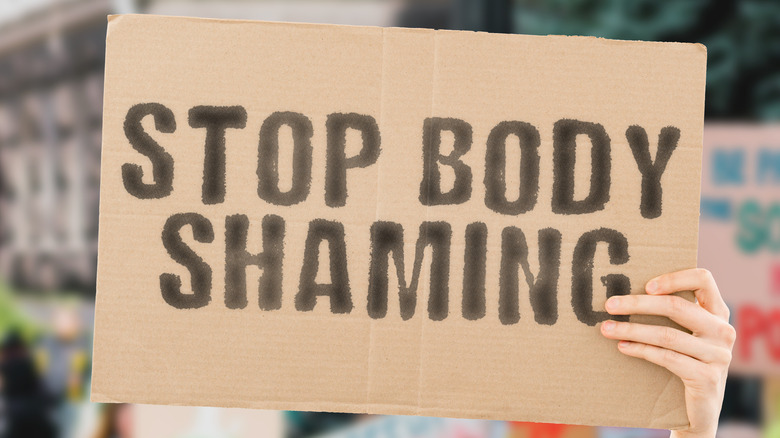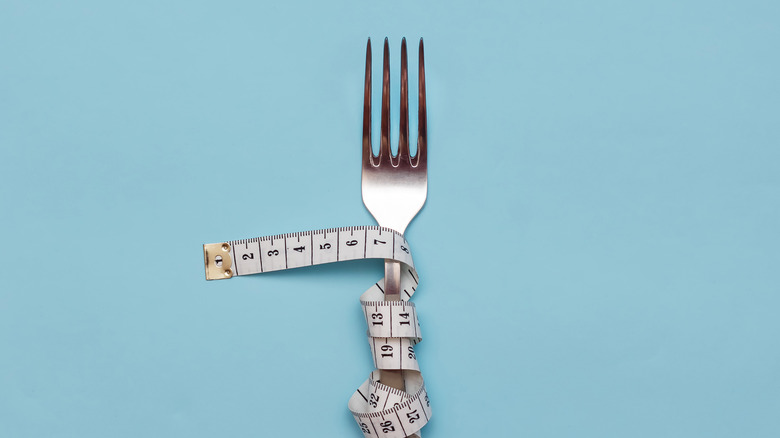What You Didn't Know About The Biggest Loser
If you're anything like us, nights home alone mean enjoying a casual amount of sauv blanc and crying through binge-watching "The Biggest Loser." As viewers, we are led to believe that we are watching people change their lives for the better. The coaches are tough and sometimes offensive, but since the contestants don't seem to squawk about it, we've always assumed it is just part of the deal. That is until a few brave ex-contestants started speaking out about the truth behind "The Biggest Loser," and trainer Jillian Michaels quit the show out of concern for the contestants' wellbeing (via New York Post).
We digress — "The Biggest Loser" is a reality TV show that takes place on "the ranch." Obese contestants are pitted against one and other in a competition to see who can lose the most weight throughout the course of filming. Since its premiere in 2004, "The Biggest Loser" has helped countless people drop unwanted poundage, but concerns over the safety of the contestants, the integrity of the environment, and the truth behind what it takes to maintain sustainable weight loss have mounted. Many of the behind-the-scenes things that we didn't know about "The Biggest Loser" are being brought to light before our eyes. Some of these little-known facts are downright brutal.
There is a lot of fat-shaming
We fully endorse people wanting to lose weight for health reasons, but it is never okay to fat-shame anyone, period. Unfortunately, the culture on the set of "The Biggest Loser," and even occasionally on camera, has left many contestants feeling ashamed of their weight (via New York Post). Furthermore, it seems that the producers can skew the storyline to fill a generic "fat and lazy" trope whenever they so choose. But according to Kai Hibbard, a past contestant on the show, the general vibe is more about shaming the contestants for being fat than celebrating their successes.
Many of the trainers have fallen under harsh criticism for their aggressive verbiage and downright mean-spirited means of "motivation" (per Screen Rant). According to Hibbard, some of the trainers would endeavor to ignite a fear of death in them so they would keep working out. In addition to trainers allegedly telling contestants to vomit to "lose calories," one account states that the contestants had to shower together without any curtains.
Some contestants walk away with eating disorders
Living under extreme conditions is likely to change your habits and your thinking. Unfortunately, the rigid and strict environment at The Biggest Loser ranch has led to more than a few contestants walking away with extreme eating disorders (via Screen Rant). It's no wonder, really. They arrive likely feeling uncomfortable in their bodies and are told that if they do X, Y, and Z, they will win the competition. So, the habits enacted in order to win end up getting transferred into real-life scenarios and can cause harm.
Ex-contestant Ryan Benson admitted publicly that he starved himself and avoided drinking water in order to bolster his weigh-ins. This why the competitive nature of the show has been under such controversy. It is healthy for obese people to lose weight, but not by means of ignoring their most basic needs.
Kai Hibbard lost 118 pounds on the show, and after living under such extreme conditions, she says she did not realize it how it would affect her day-to-day experiences post-show (via ABC News). Experts attribute the praise, adulation, and attention paid to contestants as one factor that can contribute to disordered eating. Ultimately, "The Biggest Loser" does not endorse healthy or sustainable weight loss, which can spell disaster for many contestants as they re-assimilate into the real world.
The culture at the ranch is very secretive
As is often the case for reality TV show contestants, they have to sign waiver after waiver allowing the producers to shape their narratives (via New York Post). It has also been said that the contestants have to sign contracts stating that they won't speak badly about the show. But the secretive nature only starts there. A few contestants have confirmed that they weren't allowed to call home for the first six weeks of filming because they might "give away show secrets." After the initial six weeks, contestants are given a mere five minutes in which to call home — and they're closely monitored by members of the production team all the while.
There is even one awful story of a contestant knowing that their child was extremely ill and in the ICU, but this contestant allegedly didn't want to leave the show because he thought he may not be allowed to come back (per Screen Rant). There are also accounts of producers going home for the holidays, leaving contestants under lock-and-key with only a five-minute phone call to their families on Christmas.
Much of the weight loss is achieved via calorie deficits
While achieving weight loss through a calorie deficit is the most tried-and-true way to go about such a feat, there are important caveats and nuances to this approach (via Medical News Today) — none of which were really accounted for on set. Or they were, but then taken to extreme levels. The show leans into the idea that each and every contestant is consuming 1,500 calories per day (via Screen Rant). We are led to believe that there is a personal chef whipping up low-calorie, voluminous meals that provide the contestants with all of the nutrients they need. Not so, it turns out. Joelle Gwynn, another former contestant, says she was told to consume a scant 800 calories per day, but that was told to lie on camera and say that she was eating the full 1,500, ack!
Even assuming contestants consumed 1,500 calories a day, that diet can be fairly problematic for a few reasons (per Live Strong). Your basal metabolic rate, which is the amount of calories needed to sustain bodily functions without any activity, varies based on your size, age, and gender. For women, experts typically recommend 1,200 as the absolute minimum to survive. It is recommended that men intake around 1,500 daily for baseline survival. When you drastically cut your caloric intake your metabolism slows, which sets the stage for health problems such as bone loss, muscle mass loss, and immunity issues (via Healthline). This is one explanation for why contestants like Kai Hibbard have left "The Biggest Loser" with thyroid issues, and other health problems (via New York Post). Studies explaining the link between thyroid problems, body weight, and metabolism are ongoing, but the link has been proven, and advice regarding how to safely cut calories should be heeded (per Thyroid).
And the food isn't necessarily healthy
One of the ways that the trainers ensure that the contestants are consuming as few calories as possible is by employing the ever-feared "Frankenfoods" (via New York Post). In fact, some of the food brands sponsor the show. Frankenfoods are foods that have been modified to the point of having little to no nutritional value (via T Nation). This also includes chemical-laden products and products pretending to be other products (think, I Can't Believe it's not Butter and the like).
Kai Hibbard explains that on her season their shopping lists included things like Kraft fat-free cheese, Rockstar energy drinks, and Jell-O, none of which are the cornerstones of a truly healthful diet (via New York Post). None of the items listed above are known to have any nutritional value either. Coupled with the fact that many contestants consume under 1,000 calories a day, their nutritionally-void sustenance leaves further cause for concern.
Again, as viewers of "The Biggest Losers" we are led to believe that the contestants are eating gourmet salads without dressing every night (you can save calories and rid yourself of joy by not having dressing, you know). We assume that there are teams of nutritionists dialing in each meal to fit each person's needs, but alas, that does not seem to be the case. This further hammers home the point that the weight loss achieved on the ranch is not necessarily done in a healthful or sustainable way.
Some contestants go too hard
Now that you know about the extreme dieting element of "The Biggest Loser," it should come as no surprise to learn that the workout side of the coin is outrageous as well. The contestants are required to work out all day, everyday, which is a dream to some, but not in this context (per The Atlantic). There have been reports of the contestants working out for five to eight hours per day and coupled with incredibly low caloric intakes, injuries and other bodily harm is inevitable. Miraculously, acute physical issues do not arise too often; it is the mental and emotional struggles that outlast the time while the cameras are rolling. Charming.
Ryan Benson won the first season of "The Biggest Loser" by dropping over 120 pounds (37% of his body weight!) during the course of filming. However, when he left the show, he was so malnourished and dehydrated that he was peeing blood. To add insult to injury, Benson gained the weight back after filming and the show disowned him, according to the New York Post. A few other events hinted at contestants going at it too hard, whether of their own accord or by the demoralizing nature of the trainers' motivational tactics. In 2009, two contestants were hospitalized, and in 2014, one contestant shrunk to a frail 105 pounds and sparked concerns across the country (via New York Post).
Some contestants go to extreme measures to perform well at the weigh-ins
Ryan Benson left the first ever season of "The Biggest Loser" with kidney issues due to dehydration (per The Atlantic). And why, you ask, was he so dehydrated? Because water is heavy. Some of the contestants have confessed to going to extreme measures to perform well at the weigh-ins. We would, too, if Bob Harper and his stressful fashion choices were breathing down our necks everyday.
In an interview with ABC News, Kai Hibbard said she used a number of horrifying techniques in order to achieve a lower weight on weigh-in day. After all, it is a competition about who can lose the most weight, so naturally, someone has to come out on top. What a problematic way to approach weight loss, ugh. Hibbard admitted that she would cloak herself head-to-toe in as many clothes as she could, go into the non-air-conditioned gym, and sweat it out. What's more — she would work out for up to two hours, or as long as she could stand, without drinking any water! She says that a popular technique is to sip some water, swish it around in your mouth, and then spit it out.
Unfortunately, Hibbard also says that this practice was common on the ranch, especially in the hours leading up to a weigh-in. If you don't lose enough weight, you get sent home. But the contestants were led to believe that they were so lucky to be there and that this was their only means to success so, of course, they wanted to stay and compete.
The weigh-ins are staged
The staged weigh-ins are probably one of the less problematic secrets of "The Biggest Loser." Suzanne Mendoca has been an outspoken and dissatisfied ex-contestant of the show. In an interview with ET, she stated that the weigh-ins are fake. She expanded upon this comment by saying that the gigantic scale they show on TV is fake. When the contestants step onto the scale, they are unable to actually see their weight or know how much weight they actually dropped that week. Additionally, she states that the weigh-ins are actually executed two days prior to the filming of the weigh-ins. This strange skewing of time is deceptive, no doubt. But it doesn't strike us as blatantly dangerous or disrespectful like a few of the other secrets that have been revealed.
However, another former contestant refutes this claim. He states that every single time they were weighed there were witnesses, and that their numbers were recorded and made available to them. We may never know the truth, but we do know that this specific contestant, Jay Jacobs, had a positive experience while filming and post-show (via ET).
Many contestants gain the weight back once they return home
Unfortunately, many former competitors regain the weight that they lost during their time spent at the ranch — perhaps not surprising given that the methods of weight loss being used are not remotely in line with what healthful weight loss really looks like (per New York Post). The most outspoken former contestant, Kai Hibbard, admitted that she gained weight back after leaving the ranch. She lost 121 pounds while competing on "The Biggest Loser" and refuses to say how much weight she gained back, understandably. The big problem is that the contestants lose a ton of weight while executing an extreme crash diet and are expected to maintain it once they return home. For many contestants with jobs, children, spouses, and other responsibilities, it is impossible to keep up with the extreme demands (via Screen Rant). This is at no fault of theirs, to be clear. We don't know a soul who can juggle a full-time job, a family, sleep, and 40 hours of exercise per week — especially without adequate nutrition.
Jillian Michaels took a stand and quit the show
Please, don't mess with Jillian Michaels. She is an exceptionally tough trainer and, interestingly, the only one who showed public concern about the wellness of the contestants. Don't cut her too much slack though — she has been known to say some incredibly hurtful things to the contestants. However, we assume that a portion of Michaels' portrayal on the show is due to creative editing and production. Regardless, Michaels' left the show for good in 2020. According to People, Michaels became increasingly concerned about the direction "The Biggest Loser" started taking.
Michaels' resignation from the show came shortly after the controversy surrounding Rachel Frederickson's plummet to 105 pounds; she lost a total of 155 pounds. A source told People that Michaels' felt that proper care and attention were not being given to the contestants' health or wellness. The source continues to report that Michaels was "visibly distraught" upon seeing Frederickson's skeletal frame, sans the 155 pounds she had originally been carrying when the two met. As a result, Michaels' took a stand, and we can only hope that this leads to more healthful and sustainable choices down on the ranch if the show continues to air.
One contestant claims that she was told to gain weight before filming began
One contestant claims that she was told to gain weight before filming began, and if this is true, it is repulsive (via Screen Rant). Suzanne Mendoca reports that she was told to gain weight in order to appear on the show because she wasn't "fat enough." The production team encouraged her to keep eating so she could gain 40 pounds, saying that this was a prerequisite for her to appear on the show. Before the show she weighed 229 pounds. During her first weigh-in on "The Biggest Loser" she came in at 255. Ultimately, she was manipulated into gaining more weight just to add to the drama of the show.
Other accounts suggest the production teams are often psychologically manipulative, saying that the contestants are just so lucky to be involved. This manipulation is part of what convinces contestants to do unhealthful things or follow harmful directives despite their better judgement, like to dehydrate themselves or gain weight to appear on a show that is promoting weight loss.
Many contestants leave with health problems
Ryan Benson, the first winner of "The Biggest Loser," left the show with kidney problems (per The Atlantic). Kai Hibbard recounts that this drastic approach to weight loss left her with shin splints, thinning hair, menstrual issues, and thyroid problems. None of the problems, she says, were present prior to her stint on the ranch (per New York Post).
Many of the contestants leave "The Biggest Loser" with significant knee problems, reports the New York Post. Moreover, there are reports of trainers disrespecting contestants with back problems and callously calling out others who are injured. With the magic of production comes one way to bamboozle viewers: An injured contestant can easily be edited to appear lazy or disgraceful. The contestants sign contracts that allow the producers to shape their stories as they see fit for television, so the indignity of being portrayed in this way is out of their hands.
The off-screen vomit buckets get a lot of use
One of the signs that you've pushed your body too hard during a workout is vomiting (via Medical News Today). In fact, there is a reason that you don't seem people vomiting all willy-nilly everyday at your local gym — because most people stop before they reach the point of no return. Ultra-marathoners and the occasional Olympian aside, most people don't blow chunks because of their workouts.
But on "The Biggest Loser," the vomit buckets see a lot of use (per The Atlantic). That's right, barf buckets abound on the set and within the walls of the Biggest Loser gym. Once the contestants surrender to the whims of the show, they are thrown right into circuit training. This high-intensity workout, especially for someone who is unaccustomed to it, is a surefire way to induce dry-heaving. But in the case of "The Biggest Loser," it sends overworked contestants running for the color-coded buckets that are specifically laid out for this purpose. The fetishization of going overboard with your workouts is hard to ignore while watching "The Biggest Loser." Overall, vomiting is a bodily function that is best left out of the gym.
It's not safe to lose as much weight as they do in that short amount of time
We've been dancing around this truth, but it is time to let it out. By all accounts, it is not safe to lose as much weight as contestants of "The Biggest Loser" do in that short amount of time, end of story. The contestants essentially begin a boot camp, despite the fact that many of them have never worked out before. They then get put on a crash diet. Of course people are going to lose weight under those conditions. But losing upwards of five, ten, fifteen, even twenty pounds per week is outright unhealthy and can lead to loss of muscle mass, a drop in metabolic rate, nutritional deficits, and other problems (via Healthline).
When you just start an exercise regimen and clean up your diet, you might notice a significant drop in the number on the scale during the first few weeks. However, once your body adjusts to the healthy choices you are making, you are likely going to be dropping one to two pounds per week. This moderate weight loss has been deemed healthy and sustainable time and time again. Forcing your body into starvation and exhaustion won't do you any favors. In fact, "The Biggest Loser" approach to weight loss is likely the reason why so many people leave with health problems and re-gain the weight before long (per New York Post). They went too hard, too fast, and their bodies are just trying to find their equilibrium.















